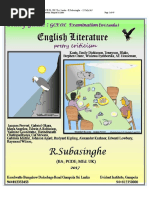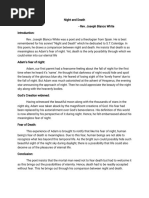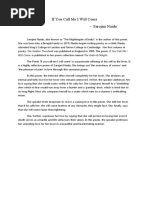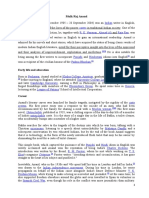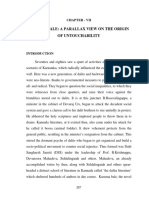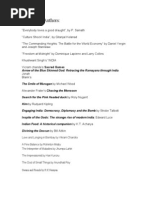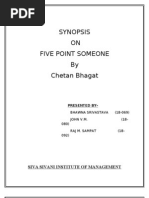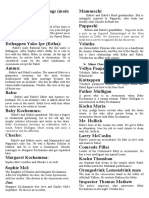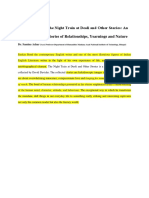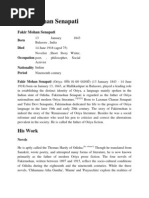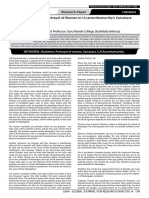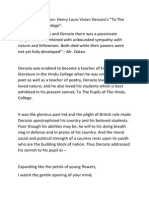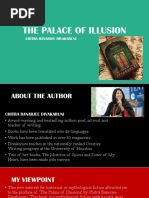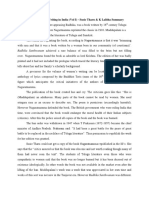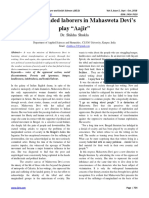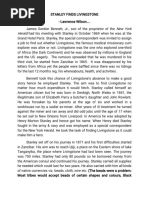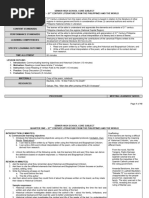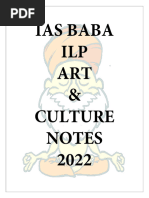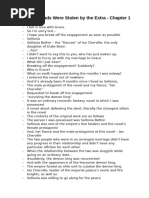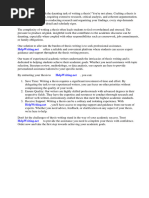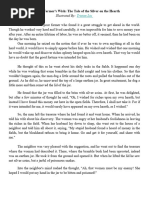My Days
My Days
Uploaded by
Gokul RamachandiranCopyright:
Available Formats
My Days
My Days
Uploaded by
Gokul RamachandiranOriginal Title
Copyright
Available Formats
Share this document
Did you find this document useful?
Is this content inappropriate?
Copyright:
Available Formats
My Days
My Days
Uploaded by
Gokul RamachandiranCopyright:
Available Formats
My Days
- R.K.Narayan
Introduction:
Narayan is one of the three leading figures of early Indian fiction, the other two being
Mulk Raj Anand and Raja Rao. He had authored over twenty books including his famous
novels, Swami and Friends, The Talkative Man, The English Teacher and The Guide. All these
novels and many others are renowned for having Malgudi, an imagined town in South India, as
their background. He also had won many prestigious awards including the Sahitya Akademi
award
Bouts of Infatuation:
The prescribed text is extracted from his autobiography, My Days, which describes
about his early bouts of infatuation and how he underwent a phase of love sickness as a
young man. With his characteristic quaint humour, he explains his crush on many girls he sets
his eyes on, invariable of colour, age and race. All these happened because of the fictional
notion of love due to his vast reading. He even had an infatuation on an elderly lady doctor
and also for a penfriend in England. After all these false starts, ‘the real thing’ happened at
last when he escorted his sister to Coimbatore.
His Bold Attempt:
Been a freelance writer, while he was staying with his sister, he happened to see a girl
drawing water from the street-tap and immediately he fell in love with her. But the social
customs that prevailed then didn’t allow him to approach her. Yet the elders of the family had
a good rapport with the girl’s father who was also a headmaster of the school in the same
locality. As the headmaster had many interests in common with the writer, it was easy for him
to befriend him and meet regularly. On one memorable evening, in the midst of their chat,
Narayan made a bold announcement of his affection for his daughter.
Obstacles in the form of Horoscope:
Though his approach was an unexpected one, everything including class, community
and caste were of no issues within their family. But there were obstacles in the form of
horoscopes in which the girl’s father was a firm believer. Since their horoscopes were
incompatible, her father expressed his rejection in gentle terms. During this ‘hopeless’ period,
Narayan went through a period of gloom and depression.
Conclusion:
After much discussion, he had been asked to meet an old-man named, Chellappa-sir,
who recommended that their marriage could take place. A few months later, they were
married with all the pomp, show and gifts of an Indian Wedding. Hence, this extract is an
evidence for his humourous narrative style, which opens a window of Indian literature to the
rest of the world.
You might also like
- Notes: English Literature, GCE OL Examination, Sri Lanka 2017 - R.SubasingheDocument49 pagesNotes: English Literature, GCE OL Examination, Sri Lanka 2017 - R.SubasingheRathnapala Subasinghe91% (248)
- Godan by Premchand Chap 7-13Document4 pagesGodan by Premchand Chap 7-13KeshavaNo ratings yet
- Essence of Shillong in Anjum Hasan'sDocument12 pagesEssence of Shillong in Anjum Hasan'sChakraborty Kanika100% (1)
- Night and DeathDocument1 pageNight and DeathGokul Ramachandiran100% (1)
- Swami and Friends LitChartDocument42 pagesSwami and Friends LitChartsheshadrisrivastav3No ratings yet
- If You Call Me I Will ComeDocument1 pageIf You Call Me I Will ComeJerinNo ratings yet
- Anand CoolieDocument4 pagesAnand CoolieVipul BhavsarNo ratings yet
- Study of Indian English PoetsDocument11 pagesStudy of Indian English PoetsPranjalGoelNo ratings yet
- Chapter 7Document30 pagesChapter 7Srinivas KNo ratings yet
- Mahashweta Devi's DraupadiDocument5 pagesMahashweta Devi's DraupadiSanchit Pahwa100% (2)
- Barlow Ae Thesis EnglishDocument212 pagesBarlow Ae Thesis EnglishNiranjan HollaNo ratings yet
- Ghashiram Kotwal PDFDocument77 pagesGhashiram Kotwal PDFbrijmohansingh401124100% (2)
- Journey of Women Characters in Githa Hariharan's The Thousand Faces of Night and Manju Kapur's HomeDocument4 pagesJourney of Women Characters in Githa Hariharan's The Thousand Faces of Night and Manju Kapur's HomeIOSRjournal75% (4)
- CHAPTER-two THEMATIC Dimensions In: Five Point SomeoneDocument50 pagesCHAPTER-two THEMATIC Dimensions In: Five Point SomeoneyogaNo ratings yet
- RequiemDocument2 pagesRequiemSanjay KkNo ratings yet
- BooksDocument106 pagesBookssurpavan0% (1)
- PDENDocument26 pagesPDENsrilekha100% (1)
- AanandamDocument101 pagesAanandamMP PooniaNo ratings yet
- 09 Chapter 3Document24 pages09 Chapter 3Diganta Kumar GogoiNo ratings yet
- Final M.phil ThesisDocument91 pagesFinal M.phil ThesisramNo ratings yet
- Five Point Someone, Synopsis1Document7 pagesFive Point Someone, Synopsis1rishikeshrishu0% (1)
- Notes Talakativeman-RK NarayanDocument22 pagesNotes Talakativeman-RK NarayanMuwaffiqaNo ratings yet
- Literature Review On R K NarayanDocument35 pagesLiterature Review On R K NarayanShishir Barik100% (1)
- Thomas Hardy and His WorksDocument19 pagesThomas Hardy and His WorksAkaNo ratings yet
- The God of Small Things CharactersDocument2 pagesThe God of Small Things CharactersIndrajit Shill0% (1)
- Ruskin Bond's The Night Train at Deoli and Other Stories An Analysis of The Stories of Relationships, Yearnings and NatureDocument9 pagesRuskin Bond's The Night Train at Deoli and Other Stories An Analysis of The Stories of Relationships, Yearnings and NatureJason Ray100% (1)
- Introducing Writers of Post Independence EraDocument6 pagesIntroducing Writers of Post Independence EraAkhtar AhsanNo ratings yet
- For My Head StoriesDocument86 pagesFor My Head StoriesomprakashvNo ratings yet
- The Thousand Faces of Night: Chapter-IIDocument35 pagesThe Thousand Faces of Night: Chapter-IISuganya Arumugam100% (1)
- The Theatrical Benefit of Girish Karnad'S Play TughlaqDocument5 pagesThe Theatrical Benefit of Girish Karnad'S Play TughlaqKashif WaqasNo ratings yet
- SASHI DESHPANDE's "IF I DIE TODAY": A STUDYDocument21 pagesSASHI DESHPANDE's "IF I DIE TODAY": A STUDYClassic PrintersNo ratings yet
- Swami and Friends.2Document1 pageSwami and Friends.2AkhilTCNo ratings yet
- Raag DarbariDocument12 pagesRaag DarbariLovely PradhanNo ratings yet
- The Indian Emperor: "Boldness is a mask for fear, however great."From EverandThe Indian Emperor: "Boldness is a mask for fear, however great."No ratings yet
- The Romantic Poets: BEGE-106Document79 pagesThe Romantic Poets: BEGE-106Shivraj GodaraNo ratings yet
- Fakir Mohan SenapatiDocument3 pagesFakir Mohan SenapatiSaroj KumarNo ratings yet
- April Raintree NotesDocument14 pagesApril Raintree NotesViola AndersonNo ratings yet
- 09 - Chapter - 02 PDFDocument44 pages09 - Chapter - 02 PDFPayal sahaNo ratings yet
- Portrayal of Women in U.r.ananthamurthy's SamskaraDocument2 pagesPortrayal of Women in U.r.ananthamurthy's SamskaraKazuma SatoNo ratings yet
- Search For Identity in DespandeyDocument117 pagesSearch For Identity in DespandeySahel Md Delabul HossainNo ratings yet
- Unit 3e The Ice Age ComethDocument4 pagesUnit 3e The Ice Age ComethSoumya SinghNo ratings yet
- To Know When To Say Its None of Your BusinessDocument1 pageTo Know When To Say Its None of Your Businesssushma DNo ratings yet
- Critical Appreciation To The Pupils of Hindu CollegeDocument4 pagesCritical Appreciation To The Pupils of Hindu Collegeingale878100% (1)
- Grandmothers HouseDocument4 pagesGrandmothers Houseanujjalans100% (3)
- The Bride by Bapsi SidwaDocument73 pagesThe Bride by Bapsi SidwaSumbal ShakirNo ratings yet
- The Palace of IllusionDocument7 pagesThe Palace of IllusionADITI MAKHLOGANo ratings yet
- English 131Document7 pagesEnglish 131tarakNo ratings yet
- Critical Analysis Swami and Friends by HDocument2 pagesCritical Analysis Swami and Friends by HParthiva SinhaNo ratings yet
- FINAL SUMMARYDocument22 pagesFINAL SUMMARYishasharma8766No ratings yet
- Aijaz AhamdDocument6 pagesAijaz AhamdAdeela ChNo ratings yet
- Indian Writing in EnglishDocument65 pagesIndian Writing in Englishkv117No ratings yet
- Outcaste A MemoirDocument12 pagesOutcaste A Memoirexam purposeNo ratings yet
- Indian Women Writing in English in India-SummaryDocument3 pagesIndian Women Writing in English in India-SummaryDushyant Nimavat0% (1)
- Palace of IllusionsDocument1 pagePalace of IllusionsAakriti PantNo ratings yet
- Women in Sudha Murty's Short StoriesDocument5 pagesWomen in Sudha Murty's Short StoriesIJELS Research JournalNo ratings yet
- NEP UG Syllabus English 3 4 Sem 29092022Document62 pagesNEP UG Syllabus English 3 4 Sem 29092022turboblade42838No ratings yet
- Short Stories of Dr. Bhabendra Nath Saikia: A Study: English 2.1Document25 pagesShort Stories of Dr. Bhabendra Nath Saikia: A Study: English 2.1Jyotiringa PuzariNo ratings yet
- Plea To The Bonded Laborers in Mahasweta Devi's Play "Aajir"Document7 pagesPlea To The Bonded Laborers in Mahasweta Devi's Play "Aajir"IJELS Research JournalNo ratings yet
- 6 Techniques For Effective Objection HandlingDocument2 pages6 Techniques For Effective Objection HandlingGokul RamachandiranNo ratings yet
- Stanley & Ramanujam EssayDocument6 pagesStanley & Ramanujam EssayGokul RamachandiranNo ratings yet
- OzymandiasDocument2 pagesOzymandiasGokul RamachandiranNo ratings yet
- Third Periodic Test in Creative WritingDocument3 pagesThird Periodic Test in Creative WritingAnne Fronda100% (1)
- What I KnowDocument13 pagesWhat I Knowadrian lozano100% (5)
- النقد الأدبي الحديث-compressedDocument146 pagesالنقد الأدبي الحديث-compressedSayed AbuzeidNo ratings yet
- Dissertation Sur Phedre de Jean RacineDocument6 pagesDissertation Sur Phedre de Jean RacineWriteMyPhilosophyPaperUK100% (2)
- Reading and Writing: First Quarter Worksheet No. 18 Context of Text Development: IntertextDocument3 pagesReading and Writing: First Quarter Worksheet No. 18 Context of Text Development: IntertextLucelle NaturalNo ratings yet
- Senior High School Core Subject QuarterDocument10 pagesSenior High School Core Subject QuarterMarc EstañoNo ratings yet
- Thesis Statement On Huck FinnDocument4 pagesThesis Statement On Huck FinnErin Taylor100% (1)
- Ias Baba Art & Culture 2022Document209 pagesIas Baba Art & Culture 2022bolur6174No ratings yet
- Lancelot Ou Le Chevalier de La Charrette DissertationDocument6 pagesLancelot Ou Le Chevalier de La Charrette DissertationPaySomeoneToWriteAPaperForMeSingapore100% (1)
- 21 Century Literature From The Philippines and The WorldDocument11 pages21 Century Literature From The Philippines and The WorldRoel Jay GanetNo ratings yet
- 21st-Century-Literature q1 Mod4 v4 PDFDocument43 pages21st-Century-Literature q1 Mod4 v4 PDFRodolf Jones Rabo100% (3)
- DominusDocument2 pagesDominusamloNo ratings yet
- In A Colonial Context: Africa and The Americas 1500-1900Document395 pagesIn A Colonial Context: Africa and The Americas 1500-1900dievelynNo ratings yet
- Delhi PersonalitiesDocument6 pagesDelhi PersonalitiesSrishtiNo ratings yet
- The Way of The WorldDocument3 pagesThe Way of The Worldindrajit0% (1)
- The Use of Supernatural Elements and Their Importance in 'Macbeth'Document2 pagesThe Use of Supernatural Elements and Their Importance in 'Macbeth'Amrita ShabnamNo ratings yet
- The Male Leads Were Stolen by The Extra Chap1Document12 pagesThe Male Leads Were Stolen by The Extra Chap1Hoàng Ngọc DiệpNo ratings yet
- University of California PressDocument30 pagesUniversity of California PressBe TiNo ratings yet
- RRL Notes 1Document10 pagesRRL Notes 1BlackLotus D. GreatNo ratings yet
- Henrik Ibsen - Plays and ProblemsDocument398 pagesHenrik Ibsen - Plays and Problemsariha raheeNo ratings yet
- Greek QuizDocument9 pagesGreek QuizCla IreNo ratings yet
- Sample Thesis FormatDocument6 pagesSample Thesis Formatamandahengelfargo100% (2)
- English Literature NotesDocument146 pagesEnglish Literature NotessimranNo ratings yet
- Blest Be The Lord (Schutte) PDFDocument1 pageBlest Be The Lord (Schutte) PDFVin VinNo ratings yet
- The Poor FarmerDocument2 pagesThe Poor FarmerViviNo ratings yet
- Practical Research 1: Quarter 3, LAS 5: Selecting and Citing Relevant Literature Using Standard StyleDocument8 pagesPractical Research 1: Quarter 3, LAS 5: Selecting and Citing Relevant Literature Using Standard StyleAleah AguraNo ratings yet
- Format For Submission of UG/PG Project ReportDocument1 pageFormat For Submission of UG/PG Project Reportbalajibs203285No ratings yet
- OZYMANDIASDocument18 pagesOZYMANDIASਕੇਸ਼ਵ ਗੁਰਜਰNo ratings yet
- 6 Word Horror Stories Lesson Plan 3Document9 pages6 Word Horror Stories Lesson Plan 3api-642177053100% (1)
